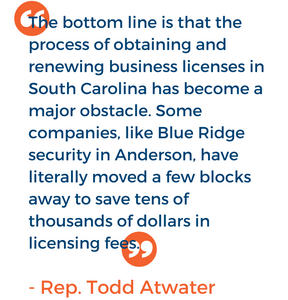Making it on Main Street

Adam Crain
Even as BMW expands, Volvo builds, and the factory line at Boeing moves, the real bedrock of South Carolina’s economy are the small businesses that populate Main Street, not the ones represented on Wall Street.
So how important are South Carolina’s small businesses to the success of our state? And what policies might improve the state’s business climate even further?
According to the Ewing Marion Kauffman Foundation, “63% of all businesses in America are small businesses, more than five years old and with 50 employees or fewer” and “48.7% of businesses are making it to their fifth year of operation.”[i] That survival rate percentage is higher than pre-Recession levels nationwide.
It is good that signs point to a growing economy. On the other hand, owning and maintaining a small business remains a difficult job.
It is clear that since 95% of all US companies hire less than 50 people, empowering small businesses through smart public policy is a must for the Palmetto State. The start-up growth rate in South Carolina is around 49.76%, but only 1.66% of those businesses end up hiring more than 50 people by their tenth year in existence.[ii] Some of that, of course, is lack of interest or need to grow that big. Some of it though, could be inability. So what are a few steps that could be taken over the next few years?
1) Tax Reform
Speaker of the House Jay Lucas recently tasked the SC House Tax Policy Review Committee with developing recommendations to create a fair, sustainable, growth-oriented tax code – a heavy lift to be sure. One change the committee could make that would help small businesses is revisiting Act 388, a 2006 law that shifted property tax burden from homeowners to businesses and rental properties, which has created huge inequities that inhibits possible growth. Smoothing out the steep financial mountain created by Act 388 would go a long way to encouraging Main Street growth.
2) Occupational Licensing Reform
The Institute for Justice reports that South Carolina is the tenth most extensively and onerously licensed state in America. Recently, we brought this to your attention from the perspective of job-seekers. But think about it from the perspective of the business owner: occupational licensing can hinder business owners from hiring or promoting quality workers because of arcane licensing requirements. Not to mention the time and expense taken from work to acquire the proper license.
Occupational licensing reform, which would determine the efficacy of required licenses and the reasonableness of the training requirements associated with them, would go a long way to remove barriers to the workforce and speed up the growth of small businesses in South Carolina.
3) Business Licensing Reform
Did you know that companies are required to hold a business license in every town, city, and county in which they operate? With different regulations, fees and due dates, running a business is hindered by the labyrinth of business licensing requirements mandated by cities and towns eager to fill the coffers. Consider an air conditioner repair service with a fleet of 15 repair trucks. Remaining in one town is a major hindrance to that business – one that exists on their ability to be mobile. In Richland County, it makes little sense for a service company to work in Columbia but ignore the nearby towns of Lexington and Irmo. From a business license standpoint though, they are crazy if they don’t ignore them. For many businesses, licensing is only a hindrance to growth and it’s therefore a hindrance to South Carolina.
Rep. Todd Atwater (R-Lexington), in his article Business License Reform Can Spur Growth, bottom lines the need for business licensing reform this way:
“The bottom line is that the process of obtaining and renewing business licenses in South Carolina has become a major obstacle. Some companies, like Blue Ridge security in Anderson, have literally moved a few blocks away to save tens of thousands of dollars in licensing fees. Many small-business owners have come to talk to legislators about the penalties, enforcement and difficulty they have working within the current licensing requirements.”[iii]
4) Prepare the Business Owners and Employees of Tomorrow Today
It is impossible to get around the fact that today’s economy is more competitive than ever before. The Palmetto State’s workforce must compete with the workforce of our neighboring states and beyond. Thus, in order to have a thriving main street, our education system needs to be the best in the country from kindergarten through higher ed.
Though there are numerous problems, one policy that would make a lasting impact now is Online Course Access – an idea we will continue to strongly advocate for. Allowing students anywhere in the state to take classes online from the best teachers SC can find is a sure way to prepare students with the skills they need to work in industry or enhance student’s preparation for college. The students of today are tomorrows workers and we should treat them as such by removing barriers to quality education now.
It cannot be underestimated the importance of Main Street – the 95% of businesses with 50 or fewer employees – to the overall economy. These four concrete steps would go a long way to improving the small business climate of South Carolina and empowering a new wave of job creation.
[i] http://www.kauffman.org/newsroom/2016/11/main-street-entrepreneurship-activity-ramps-up-nationwide-and-in-most-states-and-metros
[ii] http://www.kauffman.org/microsites/kauffman-index/rankings/state?Report=GrowthEntrepreneurship&Indicator=LRank



